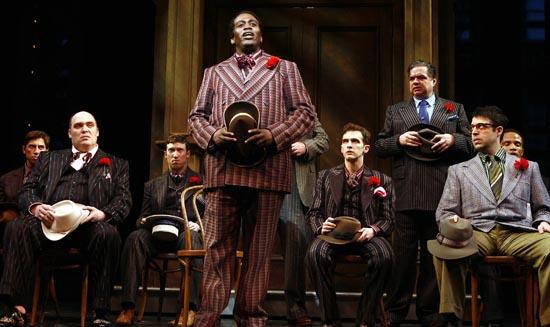By Raphael Sugarman
Nicely−Nicely Johnson’s very best friend in the world may very well be Tituss Burgess, the Queens actor who portrays him in Broadway’s latest adaptation of the classic musical “Guys and Dolls.”
Damon Runyon originally conceived of Nicely as a lonely, rather pathetic character who ultimately married an extremely corpulent woman who murdered her first husband for his money.
By the time “Guys & Dolls” hit the stage, Johnson’s characterization had improved somewhat, though he remained two−dimensional and often put−upon — a frequent foil for Benny Southstreet, an errand boy for Nathan Detroit.
Though Burgess seems fully aware of his character’s foibles and compulsions about food and gambling, he is much more benevolent towards Nicely, whom he sees as “basically a good man.”
“When he says he is doing nicely, he really means it,” said Burgess. “His aspirations aren’t that high, so he is doing brilliantly because he has made them.”
Burgess’s capacity to feel empathy towards Nicely is in no small measure a product of the actor’s own upbringing and spirituality. Growing up in the South has also given Burgess a unique perspective on how — or perhaps if —he would fit into Runyon’s bodacious and broad−shouldered New York City of the 1930s.
Raised primarily by his mother, Sandra, young Tituss’ first taste of public performance was in the rural churches of Northeast Georgia, where he sang on Sunday mornings. His earliest musical heroes were gospel singers: James Cleveland singing “Peace Be Still,” or Kurt Franklin with “Silver and Gold.”
“I loved playing that one,” he beamed, his eyes seemingly wandering to another place and time for a moment. “I still remember it so well.”
Burgess spent most summers with his grandparents in Lexington, Ga., just south of Athens. He spent hours standing alongside his grandmother Rosena’s knee as she kneaded dough for biscuits and sang hymns “in this low, rumbling voice with the most beautiful vibrato.”
Like the character Nicely−Nicely, Burgess’ grandfather Alfred, known as Buddy, had the habit of repeating his responses to certain questions, he recalled. “‘Fairly well, fairly well,’ he would often say when I asked him ‘How you doin’ today, granddad?’”
Though he has already had significant success as an actor, Burgess’s career has always been driven by singing.
While still a teenager, he began directing one church choir and then a second. By high school, he was dabbling more in acting. Still, music remained his passion and was his major at the University of Georgia. By his senior year, however, he finally decided to pursue a career in musical theater.
“I didn’t think that I was going to hit it big as an R&B singer and I didn’t have the discipline for opera, so I thought musical theater made a lot of sense,” he said.
After a year of performing at Disney World, he moved to New York in 2004, settled in Astoria, and began to audition.
In 2005, he landed the part of Eddie in the original Broadway production of “Good Vibrations.” The following year, he opened in the smash original Broadway production of “Jersey Boys,” playing singer Hal Miller and a variety of other roles. Most recently, he played the part of Sebastian in Disney’s “The Little Mermaid.”
He also performed in several regional theater productions, including “The Wiz” and “Jesus Christ Superstar. “
In 2005, he released his first recording as a singer, entitled “Here’s To You.” He wrote most of the material himself.
“I listen to it quite a bit, it’s kind of like a journal entry for me,” said Burgess. He hopes to perform at Manhattan’s Oak Room this summer, and said he is “dying to make another album.”
Despite an already diverse repertoire at age 30, Burgess admits that playing in a classic like “Guys and Dolls” is a challenge.
“This is a tricky role for me to play,” he said. “Every night is a workout.”
Though he knew that the opportunity to play in “Guys and Dolls” on Broadway was once−in−a−lifetime, the inherently reflective Burgess pondered the broader consequences of his appearance for three months before accepting the job. And not because he didn’t want the part.
“ I knew these were some of the greatest songs ever written for Broadway,” said Burgess. “But I was the only black principal in the cast. I didn’t know if it would be believable, my hanging out with all these white people in the 1930s.”
But the racial mix seemingly hasn’t raised a single eyebrow, either with critics or audience members, said Burgess.
Nicely−Nicely is certainly one of the more interesting roles in Broadway’s musical cannon. Though not considered as marquee a character as Nathan Detroit or a leading−man type like Sky Masterson, Nicely is central to three of the most recognizable songs in the show.
“I think that ‘Fugue for Tinhorns’ may be my favorite song in the show,” he said, referring to the wonderful back−and−forth Nicely and Benny sing early in the show, about a pair of “can do,” “big threat” racehorses, Paul Revere and Valentine.
Later in the opening act, Nicely and Benny perform the show’s title number, this time in heated agreement, as both bachelors lament: “When you meet a gent, paying all kinds of rent, for a flat that could flatten the Taj Mahal; call it said, call it funny, but it’s better than even money, that the guy’s only doing it for some doll.”
But it’s late in the second act, when Nicely sings “Sit Down, You’re Rockin’ the Boat,” that Burgess believes the audience gets its best glimpse of the character’s true nature.
Nathan, Sky, Nicely and the rest of the boyish thugs have been convinced to attend a prayer meeting at Sarah Brown’s church. Even though many of the tough guys have one ulterior motive or another for showing up, Burgess believes that for Nicely, the evening was an epiphany.
“I honestly believe that this man had his own little baptism, his own little redemption,” said Burgess, who is convinced that Nicely stops gambling and actually becomes the minister of the midtown Manhattan church.
“I think he finally says to himself, ‘Sit down, you’re rocking the boat. If you don’t change, you are going to fall by the wayside.’”
A lovely sentiment to be sure, but one that likely tells you more about Tituss Burgess than about Nicely Johnson.
“Guys and Dolls” is playing at the Nederlander Theatre, 208 W. 41st St.


































